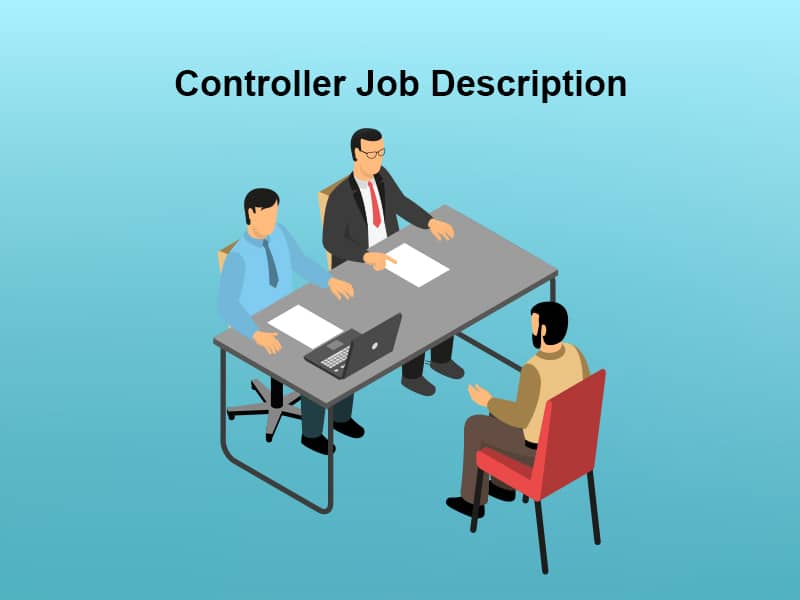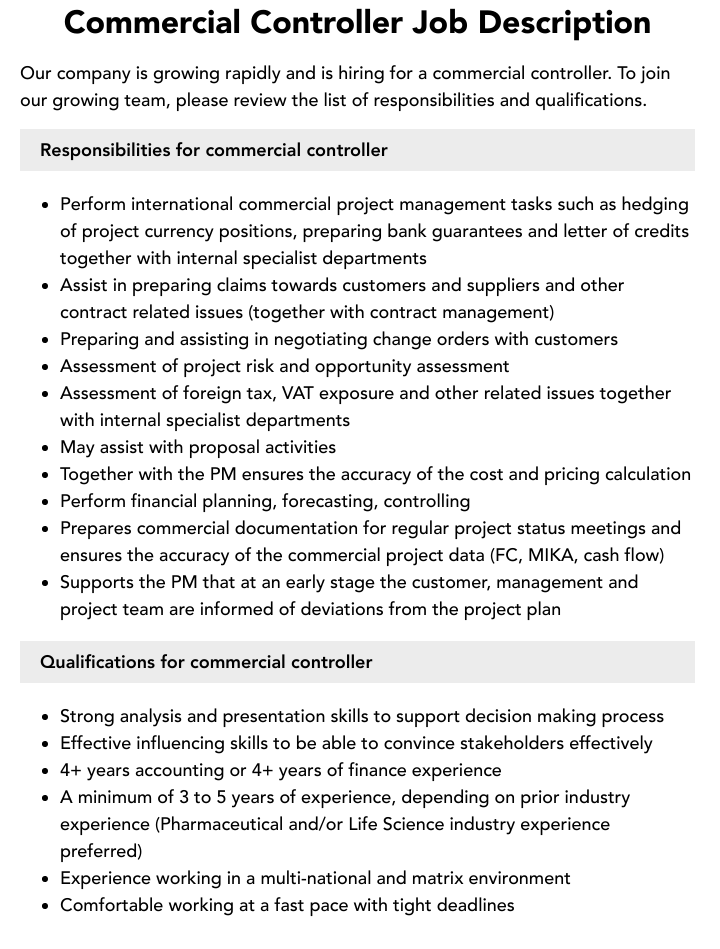Out Of This World Info About Is Controller A Good Job

Controller Finance Job Description Velvet Jobs
Is Being a Controller a Good Career Move? Let's Dive In!
1. What Exactly Does a Controller Do? The Short Version
So, you're pondering the question, "Is controller a good job?" Well, let's unpack that. A controller, in the business world, is essentially the financial quarterback. They're not just number crunchers (though they definitely do that!), they're the guardians of a company's financial health. Think of them as the person who knows where every penny is going and makes sure the financial ship stays afloat. They handle everything from preparing financial statements and managing budgets to overseeing accounting departments and ensuring compliance with regulations.
It's a role with a lot of responsibility — a lot! They're often working closely with the CFO (Chief Financial Officer) and other top executives to provide financial insights and help shape the company's overall strategy. If you like having a significant impact on a company's success, this might be right up your alley.
Basically, if the company's financials are a complicated jigsaw puzzle, the controller is the person putting it all together, making sure all the pieces fit, and presenting the finished picture to everyone else.
Think of a controller as the financial storyteller. They take all the raw data and turn it into a narrative that helps decision-makers understand the company's performance and make informed choices. It's not just about the numbers; it's about what those numbers mean.
2. The Perks and the Potential Pitfalls
Okay, let's get to the juicy stuff. One of the biggest pros of being a controller is the salary. Controllers are generally well-compensated, reflecting the importance and complexity of their role. Experience and location obviously play a factor, but it's a career path that can lead to a very comfortable lifestyle. But, like anything, there are also some downsides. The job can be demanding, with long hours, especially around month-end and year-end closing periods. Also, the responsibility for ensuring financial accuracy can be stressful, since mistakes can lead to legal issues and financial losses for the company.
Another huge plus is the career growth potential. Being a controller is a fantastic stepping stone to becoming a CFO. It gives you a broad understanding of all aspects of the company's finances, which is invaluable experience for a leadership role. You'll gain skills in areas like strategic planning, financial analysis, and risk management, making you a highly sought-after candidate for senior management positions.
On the flip side, the job can be quite detail-oriented and require a high degree of accuracy. If you're someone who hates spreadsheets and prefers big-picture thinking, this might not be the role for you. It is also true, that deadlines are deadlines. You have to deliver the financial reports on time, every time!
Controllers often have to navigate complex regulatory landscapes and deal with constantly changing accounting standards. This requires a commitment to ongoing learning and staying up-to-date on the latest developments in the field. It's a job that demands constant attention to detail and a willingness to embrace challenges.

Document Controller Job Description + TEMPLATE For 2025
Skills and Qualifications
3. What it Takes to Wear the Controller Crown
So, what does it take to actually become a controller? First off, a solid educational foundation is key. A bachelor's degree in accounting or finance is almost always a must-have. Many employers also prefer candidates with a Master's degree in accounting or an MBA with a concentration in finance. Certifications like Certified Public Accountant (CPA) or Certified Management Accountant (CMA) can give you a significant competitive edge.
Beyond the education, you'll need a strong understanding of accounting principles, financial reporting standards (like GAAP or IFRS), and tax regulations. Excellent analytical skills, attention to detail, and problem-solving abilities are also essential. And don't forget the soft skills! Communication, leadership, and interpersonal skills are vital for managing teams and working effectively with other departments.
Proficiency in accounting software and enterprise resource planning (ERP) systems like SAP or Oracle is also becoming increasingly important. The more tech-savvy you are, the better equipped you'll be to handle the demands of the role. Being able to analyze large datasets and use data visualization tools to communicate insights is a huge advantage.
It helps to have a passion for numbers and an insatiable curiosity to understand how businesses work. You need to be someone who enjoys digging deep into financial data, identifying trends, and using that information to drive strategic decisions. In short, it's a blend of technical expertise, analytical prowess, and leadership abilities.

Controller Job Description (Salary, Duties, Skills, Certification
Day-to-Day Realities
4. A Typical (Okay, Maybe Not Typical) Day in the Office
There's no such thing as a truly "typical" day, but here's a rough idea. You might start by reviewing financial reports and performance metrics to identify any potential issues or opportunities. Then, you might meet with department heads to discuss their budgets and financial performance. A significant part of your day could be spent preparing financial statements and reports for management, investors, or regulatory agencies. You might also be involved in analyzing potential investments, mergers, or acquisitions.
Another part of your day could be dedicated to overseeing the accounting department, making sure everything's running smoothly and efficiently. This might involve reviewing journal entries, reconciling accounts, and ensuring compliance with internal controls. You could also be working on improving accounting processes and procedures to streamline operations and reduce costs.
Of course, there will inevitably be some firefighting involved. Unexpected issues can arise at any time, whether it's a problem with a vendor payment, a discrepancy in a financial report, or a compliance issue that needs to be addressed immediately. Being able to handle these situations calmly and effectively is a key part of the job.
Depending on the size of the company, the controller may be managing a team of accountants, analysts, and other financial professionals. In this case, leadership skills become even more critical. The controller needs to be able to motivate, coach, and develop their team members to ensure they're performing at their best. This involves setting clear goals, providing regular feedback, and creating a positive and supportive work environment.

Senior Controller Job Description Velvet Jobs
Salary Expectations and Job Outlook
5. Show Me the Money (and the Opportunities!)
Let's talk about compensation. As mentioned earlier, controllers generally earn a good salary, and it is a solid answer to the question "Is controller a good job?". The exact figure varies depending on factors like experience, location, industry, and the size of the company. However, you can expect to earn a significantly above-average salary compared to many other professions. And, as you gain experience and move into more senior roles, your earning potential will only increase.
The job outlook for controllers is also promising. According to the Bureau of Labor Statistics, employment of accountants and auditors is projected to grow in the coming years, driven by the increasing complexity of financial regulations and the growing need for businesses to manage their finances effectively. As companies continue to expand and operate in an increasingly globalized world, the demand for skilled financial professionals will only continue to rise.
Controllers can find opportunities in a wide range of industries, from manufacturing and technology to healthcare and finance. Every company, regardless of its size or industry, needs someone to manage its finances and ensure compliance. This means there are job opportunities in virtually every corner of the economy.
As technology continues to evolve, controllers will need to adapt and embrace new tools and techniques. This includes things like cloud accounting, data analytics, and artificial intelligence. Those who are willing to learn and adapt will be well-positioned to thrive in the changing landscape of the financial profession.

Controller Job Description Velvet Jobs
Making the Decision
6. Weighing the Pros and Cons
So, after all this, is being a controller a good job? The answer, as with most things in life, is "it depends." It depends on your skills, your interests, your career goals, and your personality. If you enjoy working with numbers, solving complex problems, and having a significant impact on a company's success, then it could be a great fit for you. But if you prefer less detail-oriented work and don't like the pressure of deadlines, then it might not be the right choice.
Consider your long-term career aspirations. Do you aspire to become a CFO or hold other senior management positions? If so, being a controller can be an excellent stepping stone. It gives you the experience and knowledge you need to succeed at the highest levels of the company.
Talk to people who are currently working as controllers. Ask them about their experiences, the challenges they face, and what they enjoy most about their jobs. This can give you valuable insights into the realities of the role and help you decide if it's something you really want to pursue.
Ultimately, the decision of whether or not to become a controller is a personal one. Weigh the pros and cons carefully, consider your own strengths and weaknesses, and make the choice that's right for you. Good luck!

Commercial Controller Job Description Velvet Jobs
Frequently Asked Questions (FAQs)
7. Your Burning Questions Answered
Q: What's the difference between a controller and an accountant?
A: While both roles involve working with finances, a controller has a broader scope of responsibilities. Accountants typically focus on specific tasks like preparing tax returns or managing accounts payable. A controller, on the other hand, oversees the entire accounting function and is responsible for the accuracy and integrity of the company's financial statements.
Q: How long does it take to become a controller?
A: It typically takes several years of experience to become a controller. You'll need a bachelor's degree in accounting or finance, and most employers prefer candidates with a Master's degree or an MBA. You'll also need to gain experience in various accounting roles before you're ready to take on the responsibilities of a controller.
Q: What are some of the biggest challenges facing controllers today?
A: Some of the biggest challenges include keeping up with changing regulations, managing complex financial data, and attracting and retaining talented accounting professionals. Controllers also need to be able to effectively communicate financial information to non-financial audiences and use technology to streamline processes and improve efficiency.